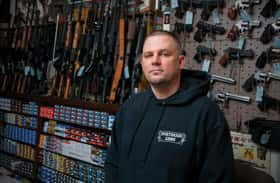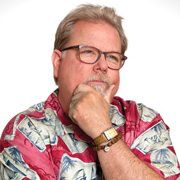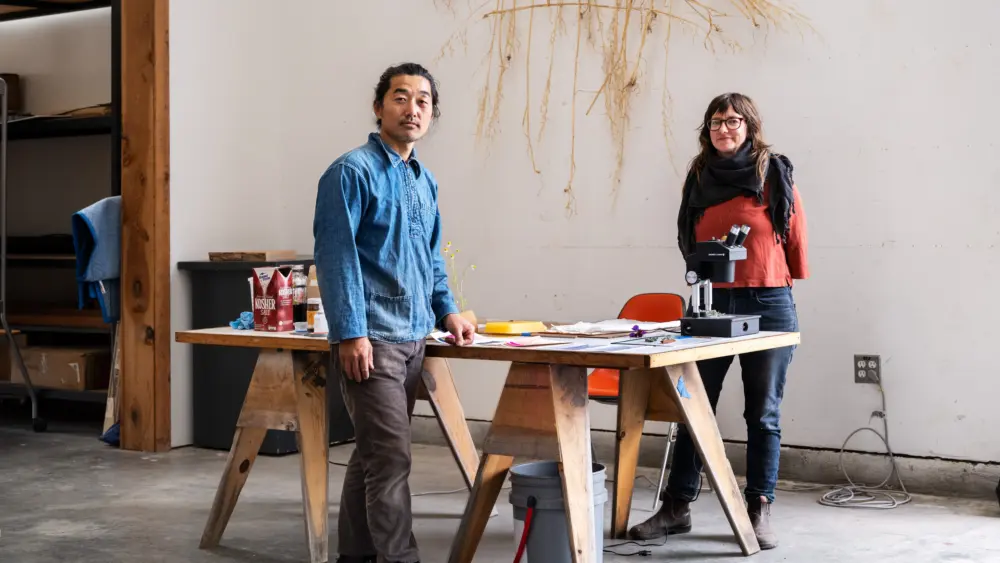In the United States, there are more places to buy a gun than a quart of milk. According to the American Firearms Retailers Association, there are 53,000 licensed gun retailers, while the Food Marketing Institute reports about 38,000 grocery stores.
That retailer count doesn’t include the 61,500 collectors and 7,300 pawnshops that also have guns for sale. And this doesn’t include gun shows or guns sold between friends (or even acquaintances) who complete the transaction on a red-tape-free basis, bonded by a handful of cash.
We like our guns. A survey by Springfield, Mass.-based gun manufacturer Smith & Wesson shows that 90 percent of gun owners have more than one gun and 25 percent of new gun owners buy another gun within one year of their first purchase.
That’s a lot of demand if you happen to be in the firearms business—and a fair amount of competition as well. “There are probably 20 places that sell guns within 20 miles of here,” says Gabriel Vaughn, who owns and operates Sportsmans Arms in Petaluma.
The Congressional Research Service says there are 300 million guns in America, the same number the National Rifle Association claimed were here in 2010. NORC at the University of Chicago’s general social survey reports 31 percent of U.S. households have guns.
The firearms industry in this country accounted for almost $43 billion in economic impact, according to the National Shooting Sports Foundation, with a total of 263,223 jobs and $13.7 billion in wages in 2014, the last year where full data is available. This is to say nothing of the $5.7 billion in state and federal taxes, and $863.6 million in federal excise taxes.
So let’s agree the manufacture and sales of guns and the equipment that goes with them is big business. Whether it’s a duck hunter in Maine, a target shooter in Virginia or a liquor store owner in California, gun sales are ringing the register. Having spent time in Chico, Calif., Missoula, Mont.; and New Orleans, La., I know there are places in the United States where owning a gun seems as common as owning a car.
But what about the North Bay? With a pronounced political lean to the left and a dearth of roadside signs pitching NRA fund-raisers, would selling guns here be tougher than selling firearms in Alabama or Nebraska? With the presidential campaign on the front page day after day, and the hot button issue of guns and their control being debated, I wondered how folks in the business of selling firearms are doing in Marin, Napa and Sonoma counties, and whether the same things that influence sales across the country rang true in the land of Cabernet Sauvignon?
So I set out to talk to people with the guns on the wall behind them, beginning with a very basic question: How’s business?
I had no idea how hard it would be to get that question answered.
Sportsman Arms

Taco, a small, quiet dog, guards the door. But maybe he’s not so much guarding the door as lying next to it. Also the notion that this store requires much in the way of defense is a little ironic. Sportsmans Arms is well-stocked with items that would come in handy should somebody step out of line. The store on the western edge of Petaluma has more long guns on the wall than you can wave a camo rifle sling at. Behind the counter, Gabriel Vaughn, who owned the store for a decade, occasionally munches tortilla chips and fields questions about the gun business.
He’s affable and intelligent, mixing information about Glocks and gun control with pop culture references and political observations. “I guess 80 percent of my business is guns, mostly rifles,” he says, adding that, “probably 60 percent of my customers don’t hunt.”
So if his customers aren’t hunters, who are they? “They’re mostly sport shooters, people who like to shoot and own guns. But there are also people buying guns because they don’t feel safe. We have a lot of women, gays, lesbians, transgenders and a lot of minorities. We want people to be comfortable here. You notice I’m not wearing a gun, I don’t want anyone feeling uncomfortable or threatened.”
As we ease into our conversation, Vaughn finished up selling some ammo to a couple customers who are on a first name basis: two retired police officers who need some boxes of bullets for “plinking” (informal target practice).
Vaughn says he’s seen an increase in the number of women as customers in the last year. “There’s been a lot of word of mouth. And there are more TV shows where the lead characters are woman who carry guns. When Sandy Hook happened, we had women in here with kids. Attacks like that make people feel threatened.”
The gun industry, like any business sector, understands who their customers are and markets accordingly. Accessories for women who go armed include purses designed for concealed carry and smaller holsters. The gun industry estimates 20 percent of new guns sold are purchased by women.
Smith & Wesson marketed a specific line of pistols aimed squarely at women. The “Lady Smith Revolvers” are smaller, lighter guns designed to fit a woman’s hand better with less recoil when fired. They even come with pink grips, and I’m not making that up. Vaughn just shakes his head over the pink grips (none of which I see in his displays).
Business has increased for his shop every year, he says with sales influenced by traditional factors like the holidays and tax time. Business is pretty steady, but anytime people have “more discretionary money, we see an increase.”
Vaughn says owning a gun shop in the North Bay has something in common with pornography: “Nobody around here wants to talk about owning guns or shooting guns or wanting to buy guns. But every year my business increases. People are interested in guns, but nobody brings it up. Most people don’t want to be ‘seen’ like that. In that way, it’s like porn.”
Forbidden fruit
Once you get past the core customer base—those who already own guns and like to shoot them—the drivers for his store include fear, politics, a down economy, talk of increased gun control and mass shootings, he says. The most consistent sales influence? President Barack Obama. “No doubt, he’s the strongest salesman. Every time he talks about gun control, sales go up.”
“America is a culture of guns. Americans will not stand for politicians taking their guns away,” says Josh Waldron, CEO of SilencerCo. Waldron, who heads up the company that makes silencers for all types of guns, was speaking at the Shooting, Hunting and Outdoor Trade Show in Las Vegas in January. “The president has done everything he can to pass anti-gun legislation and, let’s face it, he hasn’t been able to do anything other than help the industry sell more guns than ever.”
Vaughn agrees. “If somebody said that you might not be able to buy a soccer ball, what are you going to do? You might go buy a soccer ball in case you want one. You want to do something about gun control? Stop talking about gun control,” he says.
The subject of guns is deeply immersed in politics today, dipped deeply in the holy water of the Second Amendment, with some of its supporters dwelling in the church of Get The Government Off My Back. On the other side are proponents who argue that mass killings are tearing the country apart, and personal freedoms need a check when children lie dead.
That political and emotional chasm makes it tougher for guys like Vaughn. “We regularly turn down people who want to buy a gun. We’ve never had one of our guns tied to a crime, and we don’t want that. But with guns, there’s no middle ground anymore. It’s like politics, but more emotional.”
Although NorthBay biz reached out to more than a dozen retailers, Vaughn was the only gun dealer who would talk on the record. Some begged off, saying they were too busy for an interview. Others said they had a standing policy of not talking with the media. A few simply didn’t return phone calls.
In the interest of full disclosure, I’ve never owned a gun. I went shooting once while in college (with a neighbor who had a job hunting squirrels for almond farmers in Chico). I fired a number of times and may have hit one squirrel. As a recovering Catholic, I’m still working through that. Owning a gun isn’t my thing, but I have plenty of friends who own guns and, for the most part, I understand their reasons.
When I mention this to Vaughn, he says his wife doesn’t share his passion for firearms, even though he’s a collector. I tell him we own a house, outside Placerville a ways, and that the armed yahoo factor in El Dorado County is significant enough so that, for the first time in my life, I’m considering buying a gun.
He nods and says I have plenty of company. “My wife was at a CVS in Santa Rosa the other day, and there’s a guy out in the parking lot yelling. It shook her up. She didn’t like how that made her feel.”
Good business at the range
From Anderson Drive, San Rafael’s Bullseye Shooting Range & Firearm Store is easy to miss, as it’s tucked away on a section of street with a mix of retail and industrial, next door to a sewage treatment plant with Highway 580 fronting it on the other side. From the parking lot, the range, marked by a simple sign, sounds more like somebody framing a house, with a constant bang of nail guns joining steel to lumber.
But inside, the arms facility is all business. A counter filled with automatic pistols for rent fronts the door to the shooting range. Several signs lay out the rules that govern conduct at Bullseye, and the shop includes other counters filled with pistols for sale as well as long guns, ammo and accessories.
On a Sunday afternoon a week before the Super Bowl, the range is jammed, with a waitlist to shoot. The shop has a number of people browsing rifles and pistols. A woman fills out information to buy an automatic pistol.
On the range, spent shells dot the floor as shooters take aim at paper targets. Cordite hangs in the air and the guns provide an uneven rhythm section that penetrates ear muffs. Firing a Glock 34, the pistol bucks more than you might think, rendering all those episodes of “Law & Order” a harsh fiction. The target shows a number of hits but no tight circle that would demonstrate a technical proficiency.
Bullseye is part of a group of stores owned by Kris Jacob, a gentleman with his own interesting backstory. Though he grew up around guns as a youngster on a ranch in Missouri, he didn’t really get involved with firearms until he was held up at gunpoint in San Francisco in 1994. From there, he spent much of his free time learning about guns and training with the NRA and a variety of other organizations, as well as undertaking combat defense courses with SEALfit Academy.
He’s also vice president of the American Firearms Retailers Association and took part in the January 7 Guns in America town hall meeting in Fairfax, Va., where President Barack Obama took questions. Days before, Obama authored an executive order in which he sought to improve the system of how background checks are done as well as requiring checks under new circumstances.
A transcript from the CNN broadcast shows Jacob told the president that business under his administration has been busy indeed. He told the president that he and the other 53,000 licensed gun dealers, “stand behind the counter and say ‘No’ to people all day long. We feel it’s our responsibility to make sure that people who have a criminal past—people who are having a bad day—don’t get possession of firearms.”
He then asked the president about his January executive order in which he said 200 new inspectors would be hired to audit gun checks and records. Jacob suggested hiring 200 more Alcohol, Tobacco and Firearms agents would make more sense: “If we can enforce the laws that already exist, the tens of thousands of gun laws that are on the books right now, it might create a very significant deterrent.”
The upward trend
Statistics from the FBI show that background checks keep increasing, an indication that not only is there increased interest in guns, but that dealers like Jacob and Vaughn have more interaction with law enforcement on a regular basis. In January, there were 2.5 million checks that ran through the National Instant Background Check System, the busiest January ever. It was the third month in a row in which more than 2 million checks were processed, and the ninth month in a row that set a record. The all-time record for checks was December 2015, following the terrorist shootings in San Bernardino, according to the FBI.
It’s worth noting that not every check results in a gun sale, since some buyers are rejected and other times customers decide against the purchase even if they pass the check. Also, sales at gun shows and by collectors don’t show up in those numbers.
I wanted to follow up with Jacob about his views on gun control and if selling guns in his stores in Castro Valley and Nevada was different than Marin, but several efforts to reach him failed.
In Petaluma, Vaughn says he sells more AR-15s than any other gun. It’s a semi-automatic rifle, can be fitted easily to any user, is accurate and the ammunition is cheap. It’s been around since 1959 and was adapted to become the M-16 used by the U.S. military. While it looks like what we’ve been conditioned to think of as a machine gun, it can’t be sold as an automatic weapon. It’s essentially a .22 on steroids and the most popular gun in the world, Vaughn says.
Which is a little ironic. One of our favorite pursuits in the North Bay is to consider how lucky we are—the original humble brag. We live in a place of great natural beauty and we take great care to see to it that It stays that way, so we care more about Mom Earth than most. The notion that our children are superior in almost every way is practically a given, and if you don’t believe that, spend more time listening at dinner parties. Of course we make the best wine in the world.
That last one happens to be true, so suck on that, France.
But the AR-15 sells like organic fair trade kale around here, which puts us in company with Duck Hill, Miss. In fact, despite all of the things we tend to think separate us from the herd, when it comes to buying guns, we’re a lot like the rest of the country.
We’re just quieter about it.
Author
-

Bill Meagher is a contributing editor at NorthBay biz magazine. He is also a senior editor for The Deal, a Manhattan-based digital financial news outlet where he covers alternative investment, micro and smallcap equity finance, and the intersection of cannabis and institutional investment. He also does investigative reporting. He can be reached with news tips and legal threats at bmeagher@northbaybiz.com.
View all posts



